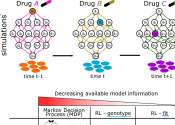Large study finds antibiotics aren't effective for most lower tract respiratory infections
Use of antibiotics provided no measurable impact on the severity or duration of coughs even if a bacterial infection was present, finds a large, prospective study of people who sought treatment in U.S. primary or urgent care ...
Apr 15, 2024
0
105




